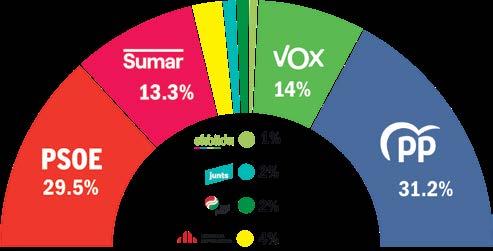
2 minute read
ELECTION FE
ON July 23, Spaniards will be heading to polling booths for the fifth time in the last 10 years, to choose the next prime minister and the government.
But according to the polling, it is far from clear who will be picked by voters and indeed whether any party or parties will get enough votes to avoid a stalemate.
Here is a complete guide to everything you need to know ahead of this key moment in Spanish politics.
WHY ARE WE HAVING ELECTIONS NOW?
After forming Spain’s first coalition government since the country returned to democracy in the 1970s, PSOE Socialist Party Prime Minister Pedro Sanchez has repeatedly stated that he would see out the entirety of his fouryear term.
His administration was formed in early 2020 thanks to the support of junior partner Unidas Podemos, and the PM could have called elections as late as December of this year.
But after the May 28 local and regional
WHO ARE THE MAIN PARTIES STANDING?
Sanchez is running for reelection as prime minister, despite his reputation having taken a hit over the last four years thanks to the deals he has done with smaller, nationalist parties such as the Catalan Republican Left and EH Bildu, the former political wing of Basque terrorist group ETA. His main opponent is Alberto Nunez Feijoo of the PP, followed by Santiago Abascal of the far-right Vox.
A newcomer is Sumar, a leftist alliance that has absorbed the two component parts of Unidas Podemos, the United Left and Podemos itself, as well as other smaller leftist parties from Spain’s splintered political spectrum. The candidate for Sumar is current deputy prime minister and labour minister, Yolanda Diaz.
HOW DO GENERAL ELECTIONS WORK IN SPAIN?
Spaniards will be voting for the 350 deputies who will take their seats in the lower house of parliament, the Congress of Deputies.
Spain uses the D’Hondt method, which allocates Congress seats in proportion to the number of votes received, as well as a closed-list system of candidates, meaning that voters choose the party rather than the politicians who are running.
As for the Senate, the 208 seats are allocated using an open-list system, where electors vote for candidates rather than parties.
WHAT DO THE POLLS SAY?
While the predictions vary as to what will happen, one thing seems certain: no single party will win an outright majority of 176 seats in the 350-seat Congress, meaning a coalition is inevitable. The latest poll from Spanish daily El Pais predicts the PP and Vox will fall eight seats short of an absolute majority, with 125 seats for the former and 43 for the latter, a total of 168.
The survey, carried out by pollster 40dB, also predicts 111 seats for the PSOE and 35 for Sumar, for a total of vative newspaper ABC has predicted that the PP tween 175 and 183 seats, potentially paving the way mation of
Simon Hunter simon@theolivepress.es
Alex Trelinski alex@theolivepress.es
Cristina Hodgson cristina@theolivepress.es
Walter Finch walter@theolivepress.es
OFFICE MANAGER Héctor Santaella (+34) 658 750 424 accounts@ theolivepress.es
DISTRIBUTION ENQUIRIES (+34) 951 273 575 distribution@ theolivepress.es
NEWSDESK: 0034 951 273 575
For all sales and advertising enquiries please contact 951 27 35 75
HEAD OFFICE
Carretera Nacional 340, km 144.5, Calle Espinosa 1, Edificio cc El Duque, planta primera, 29692, Sabinillas, Manilva
Deposito





